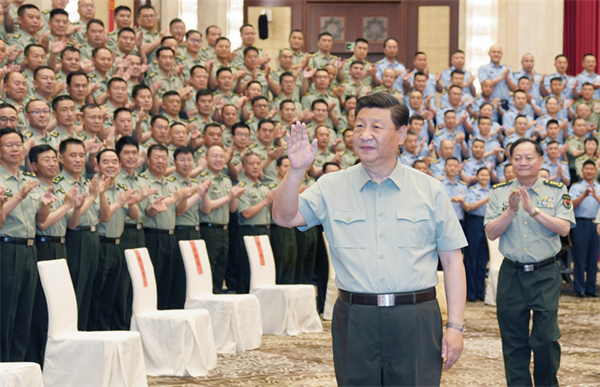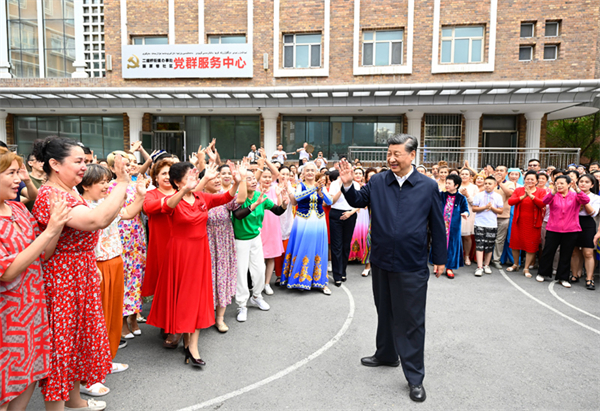
URUMQI — President Xi Jinping has stressed efforts to fully and faithfully implement the policies of the Communist Party of China (CPC) for the governance of Xinjiang in the new era, highlighting social stability and lasting security as the overarching goal.
Xi, also general secretary of the CPC Central Committee and chairman of the Central Military Commission, made the remarks during his inspection tour in Northwest China's Xinjiang Uygur autonomous region from July 12 to July 15.
Xi called for developing Xinjiang into a region that is united, harmonious, prosperous and culturally advanced, with healthy ecosystems and people living and working in contentment.
During the inspection tour, Xi went to Urumqi, capital city of the region, and the cities of Shihezi and Turpan, visiting a university, an international land port area, a residential community, museums, a village, and the Xinjiang Production and Construction Corps (XPCC), among other sites.
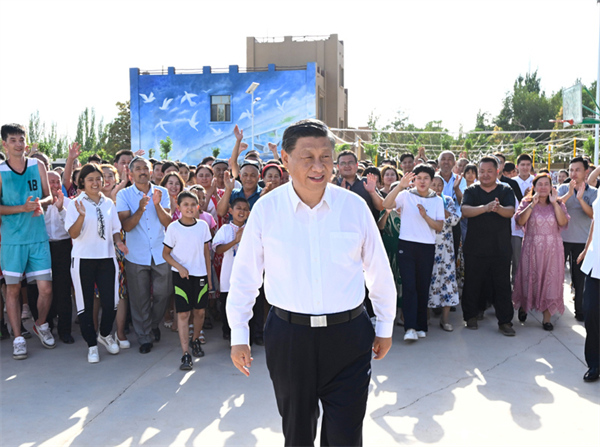
While visiting Xinjiang University on the afternoon of July 12, Xi learned about its history and development, and its efforts in nurturing talent and promoting exchanges among different ethnic groups. Xi also listened to a briefing by students who had conducted a field study.
Xi said that, as a unified multi-ethnic country, China boasts harmonious relationships between its diverse, interwoven ethnic groups. He said that all ethnic groups enjoy equality, unity and progress under the socialist system, stressing that the Party's theories and policies concerning ethnic groups are sound and have produced the desired effect. He called for promoting research on the basic issues of the community for the Chinese nation.
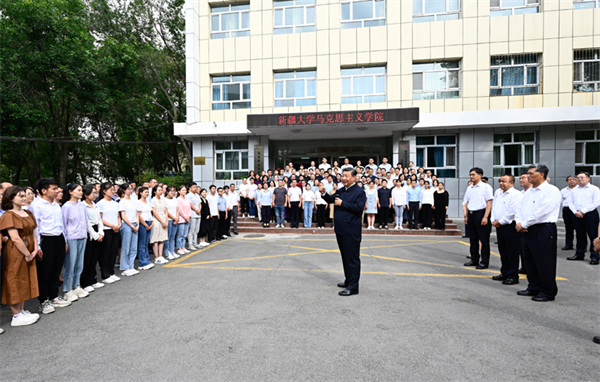
Xi said that, in nurturing talent, it is essential to foster virtue. He asked the university to highlight its advantages and unique features, foster a high-caliber team of teachers, and improve its research and innovation capabilities.
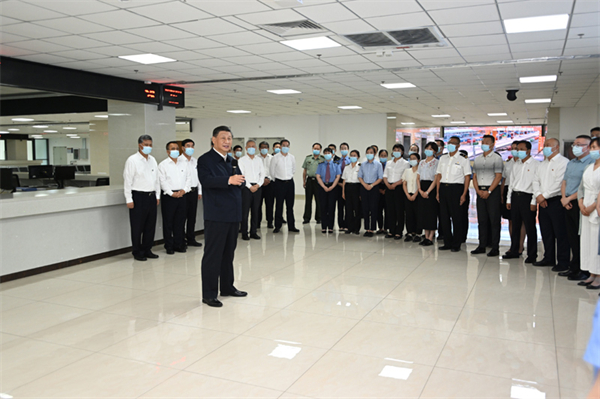
While visiting the Urumqi International Land Port Area, Xi noted that Xinjiang has morphed from a relatively enclosed hinterland into the forefront of opening-up, as the country is promoting the expansion of opening-up, the development of the western regions, and the joint building of the Belt and Road.
Xi stressed advancing the building of the core area of the Silk Road Economic Belt and incorporating Xinjiang's regional opening-up strategy into the country's overall plan of westward opening-up.
Xi highlighted the importance of innovating the system for an open economy, boosting the building of large opening-up corridors, better utilizing both domestic and international markets and resources, and actively serving and integrating into the new pattern of development.
He also called for upholding the dynamic zero-COVID policy, asking for targeted COVID-19 response that is convenient to the people.
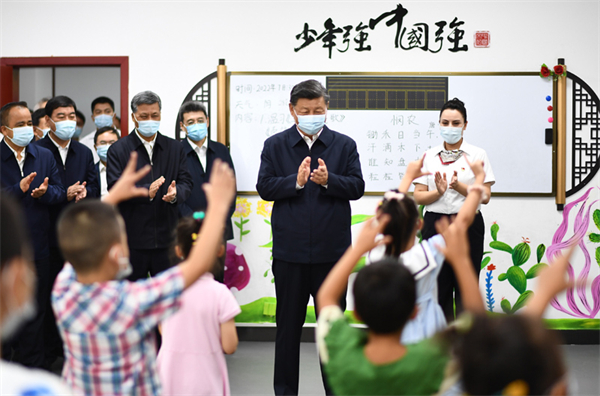
On the morning of July 13, Xi visited the residential community of Guyuanxiang in the Tianshan district in Urumqi, in which people from ethnic-minority groups account for more than 95 percent of the total residents.
The education of fine traditional Chinese culture for young people at an early age will help lay a solid foundation for carrying on the fine traditional Chinese culture, Xi said after watching a performance by children.
Ethnic unity is the lifeline of all ethnic groups in the country, and all ethnic groups in Xinjiang are inseparable members of the big family of the Chinese nation, Xi said while visiting the home of a local resident, calling for cherishing the stability and unity that have already been achieved.
Xi urged efforts to make full use of the primary role of community-level Party organizations to ensure that all ethnic groups are like brothers and sisters who help each other.
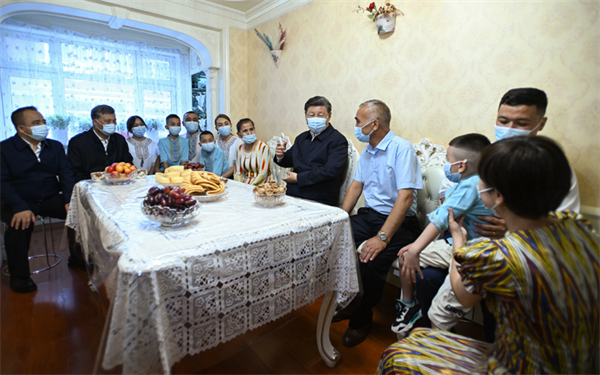
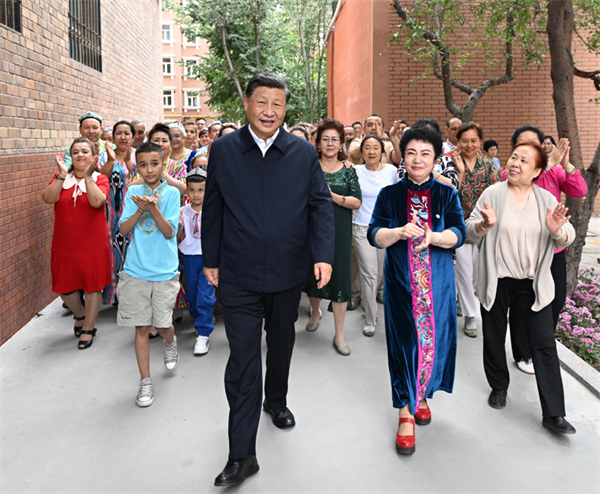
Xi visited the Museum of the Xinjiang Uygur Autonomous Region and watched a show of the Kirgiz ethnic minority epic Manas at the museum. Chinese civilization is extensive and profound, and has a long history stretching back to antiquity, Xi said, demanding efforts to better preserve and pass on the intangible cultural heritage, and to carry forward the fine traditional cultures of all ethnic groups.
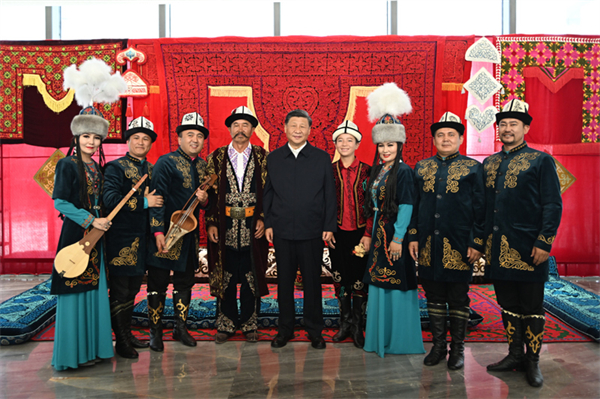
Visiting the city of Shihezi on the afternoon of July 13, Xi hailed the XPCC's indelible contributions to promoting Xinjiang's development, ethnic unity, social stability and border security.
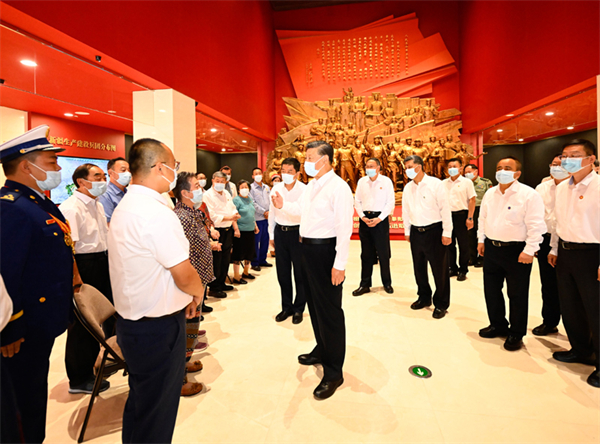
The XPCC enjoys a high degree of agricultural mechanization and good conditions for large-scale agricultural production and industrialized operation, said Xi, urging the XPCC to play a greater role in ensuring the country's food security and the supply of important agricultural products.
Xi demanded strengthening agricultural science and technology and equipment support to develop competitive agricultural products and industries in light of local conditions, and promoting the green and efficient development of agriculture and animal husbandry.
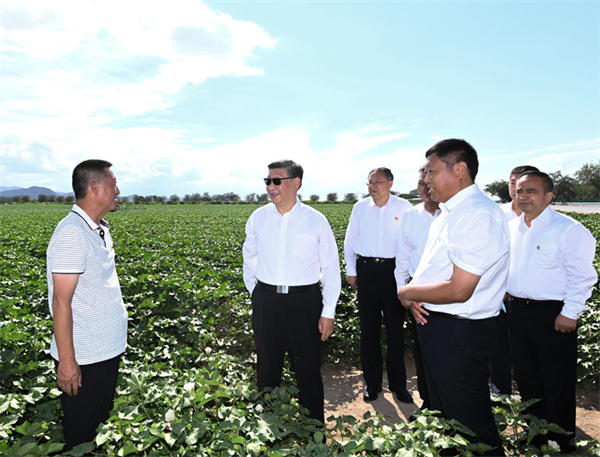
Calling the XPCC's strategic status "irreplaceable," Xi expressed his hope that the XPCC will give full play to its role as a stabilizer for securing border areas, a melting pot for bringing people of all ethnic groups together, and a demonstration area for advanced productive forces and culture.
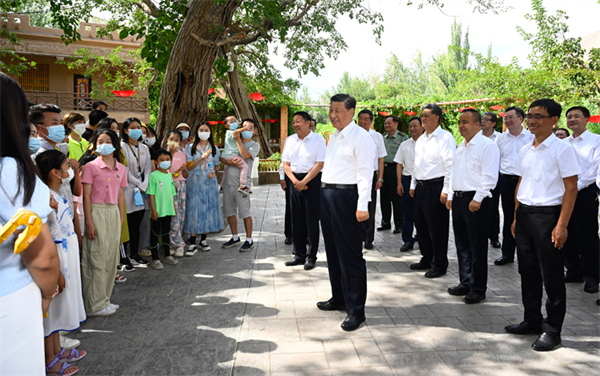
Touring the city of Turpan on July 14, Xi visited Grape Valley, a local village, and the Jiaohe Ruins.
He stressed efforts to strike a proper balance between economic and social development and eco-environmental protection, consolidate and build on the achievements in poverty elimination, make solid progress on rural revitalization, and strengthen the preservation and use of cultural heritage.
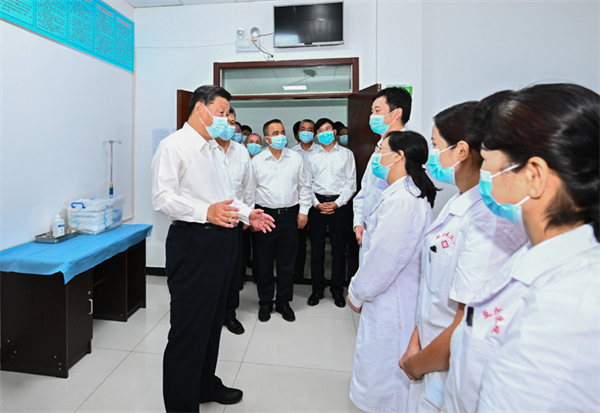
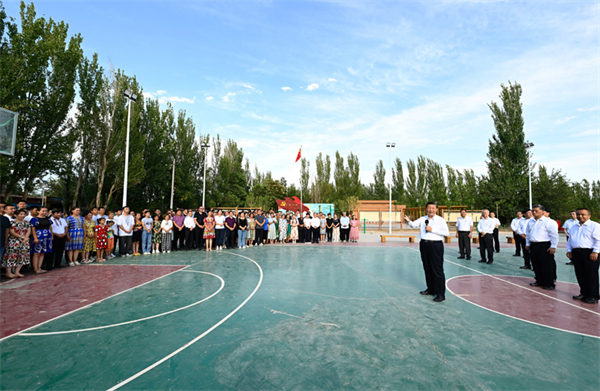
On the morning of July 15, Xi heard work reports from the regional Party committee, the regional government, and the XPCC, and acknowledged the progress in Xinjiang.
The people's support is the most important factor in maintaining long-term stability in Xinjiang, Xi said, urging measures to ensure that stability is maintained in accordance with the law and on a regular basis.
Xi stressed fostering a strong sense of community for the Chinese nation, promoting exchanges, interactions and integration among different ethnic groups, and helping them remain closely united like the seeds of a pomegranate that stick together.
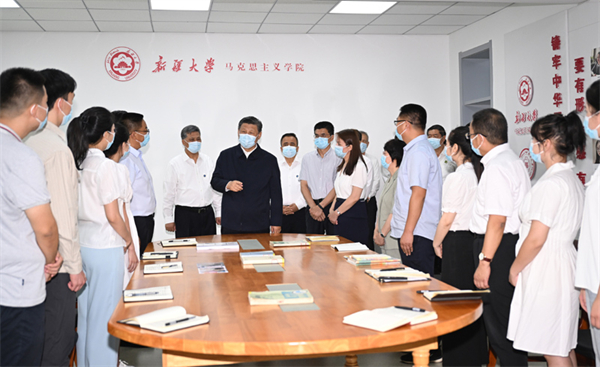
Xi pointed out the need to improve governance capacity of religious affairs and realize the healthy development of religions.
Enhanced efforts should be made to uphold the principle that Islam in China must be Chinese in orientation, and to adapt religions to socialist society, he said.
The normal religious needs of religious believers should be ensured and they should be united closely around the Party and the government, Xi added.
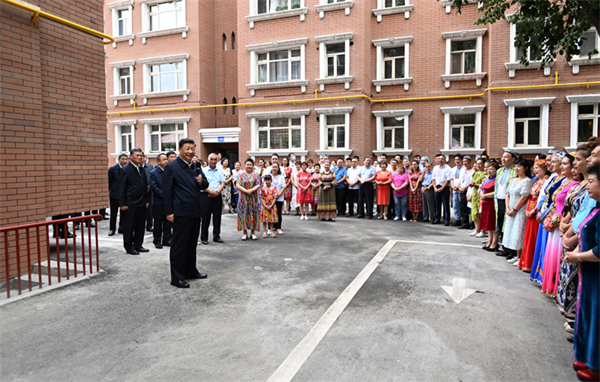
Stressing the importance of cultural identity, Xi called for educating and guiding people of all ethnic groups to strengthen their identification with the motherland, the Chinese nation, Chinese culture, the CPC and socialism with Chinese characteristics.
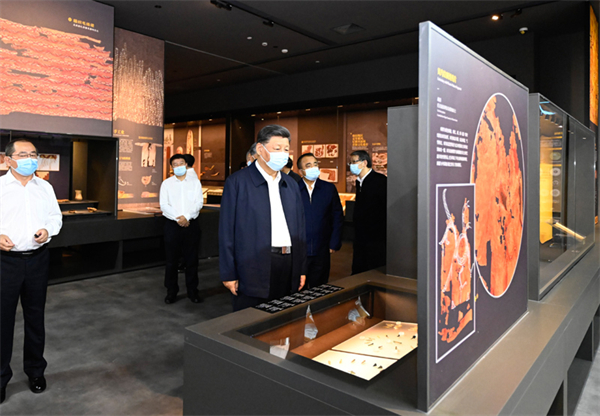
The achievements of development should better benefit people's well-being and rally people's support, Xi said, calling for efforts to speed up high-quality development of the region's economy, further create employment opportunities and improve the long-term mechanism for sustainable development in the rural areas.
He urged Xinjiang to step up anti-pollution efforts and hold firm to the redlines for ecological conservation.
He also called on Xinjiang to further open up and advance the development of the core area of the Silk Road Economic Belt.
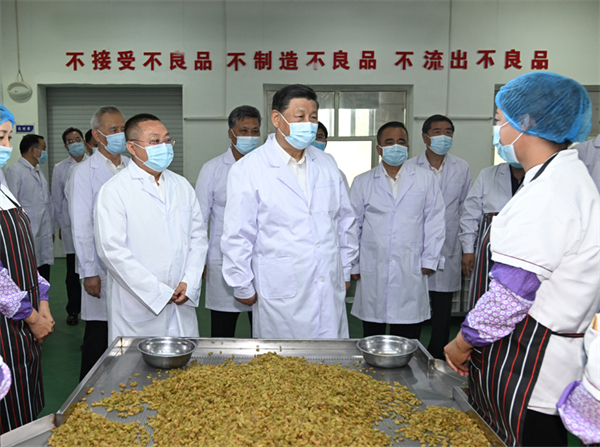
Party authorities must exercise full and rigorous self-governance, Xi said, adding that the region should optimize the structures of leadership bodies and give full play to the roles of ethnic cadres.
Xi urged the XPCC to play a bigger role in realizing the overarching goals of Xinjiang, and advance its integrated development with the civil sectors.
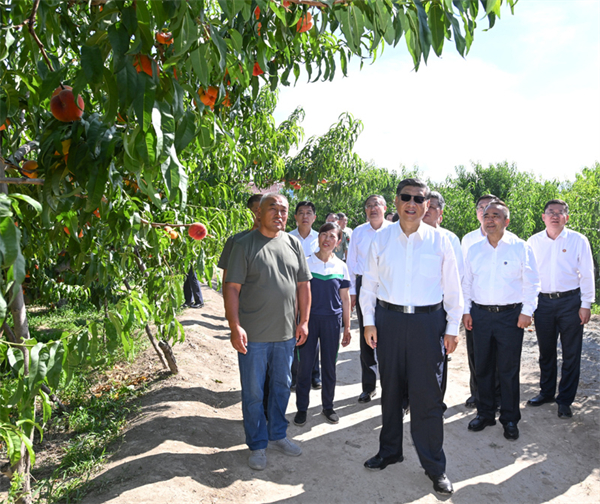
He also called for more efforts in pairing-up aid to Xinjiang.
Before the meeting on July 15, Xi met with representatives of current and retired officials at different levels in the region, leading officials of the XPCC and officials of relevant departments, and representatives of different ethnic groups and sectors, cadres working on aiding programs, law-enforcement officers, and patriots of religious circles.
On the morning of July 15, Xi also met with military officers and troops stationed in the region.
